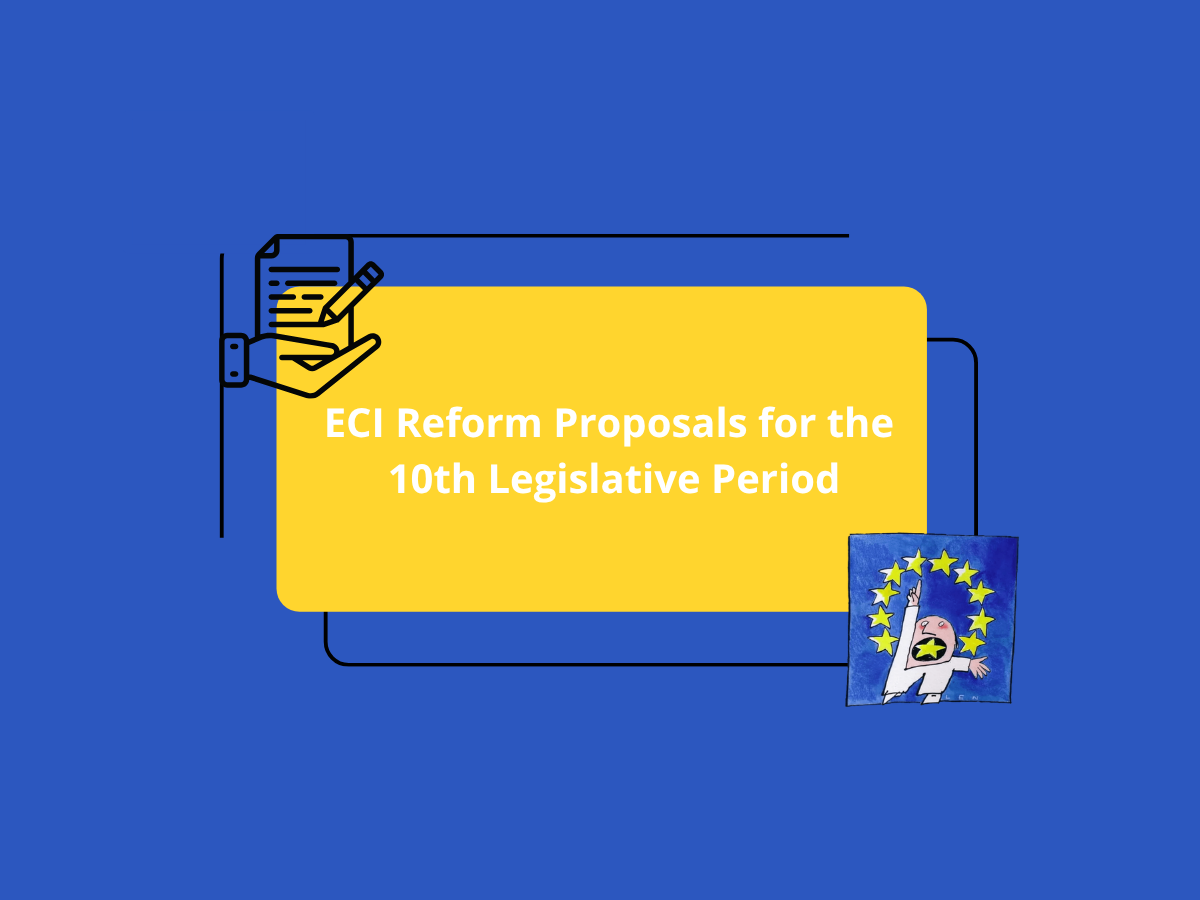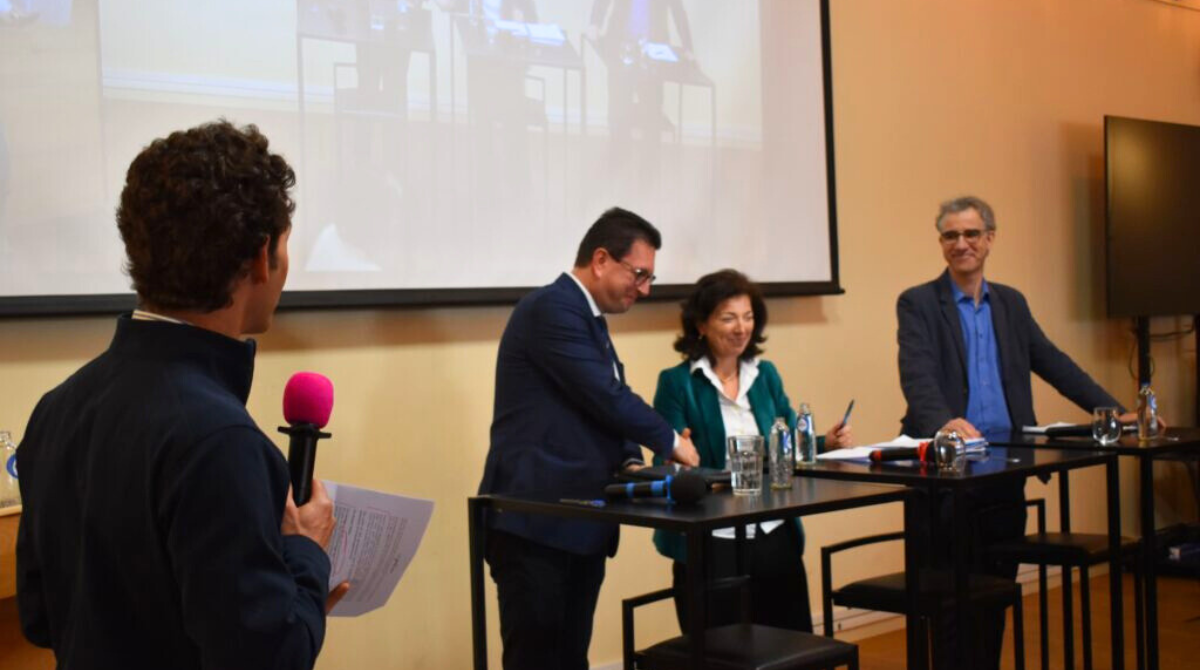
With over 13 years of firsthand experience since the ECI Regulation came into force in April 2012, we firmly believe that a bold, renewed set of reforms is urgently needed to unlock the full potential of the ECI and establish it as a truly impactful and effective instrument of participatory democracy in the EU. Although the ECI was introduced as a way for EU citizens to directly influence policymaking, it has, so far, fallen short of this promise. Structural weaknesses, procedural barriers, and a significant lack of political will have considerably constrained its effectiveness and dissuaded many from using it. Our proposals aim to address these challenges and ensure that the ECI lives up to its democratic potential.
1. Improve the Registration Process
The registration process remains an obstacle to citizen participation despite the introduction of partial registration. The European Commission’s dual role in both assessing ECIs in the registration phase and responding to initiatives in the follow-up phase presents a structural conflict of interest that undermines the integrity of the process. We recommend removing this bottleneck by transferring the competence check to a neutral institution or by introducing a fast-track judicial review procedure with mandatory deadlines.
2. Strengthen Legal Protections
Organisers of European Citizens’ Initiatives (ECIs) currently lack adequate legal standing, especially when registration decisions are challenged by member states. Despite being directly impacted, organisers have no formal role in these proceedings. To address this imbalance, we recommend amending the Statute of the European Court of Justice to explicitly allow ECI organisers to intervene in such cases. This change would ensure fairer legal representation and reinforce the democratic legitimacy of the ECI process.
3. Expand the Scope of the ECI
The scope of the ECI should be broadened to allow citizens to propose amendments to the EU treaties. Currently, this is not explicitly permitted, but there is no legal obstacle to doing so. Enabling such proposals would empower citizens to actively shape the constitutional development of the EU, ensuring the ECI remains a meaningful tool for democratic engagement at the highest level.
4. Enhance the Online Signature Collection Process
The ability to collect signatures both efficiently and effectively is essential for the success of any ECI. The discontinuation of individual Online Collection Systems (iOCS) as of January 1, 2024, has raised serious concerns. These systems provided campaign flexibility, better outreach, and more precise data analysis—crucial for improving organisers’ communication strategies in real time. Importantly, initiatives that used iOCS had a significantly higher success rate in reaching the one-million-signature threshold compared to those relying on the Commission’s central system. This demonstrates the effectiveness of iOCS in supporting citizen engagement. We therefore recommend maintaining and further developing individual Online Collection Systems alongside the central platform to preserve choice, foster innovation, and enhance campaign impact.
5. Provide Financial Support
Financial barriers continue to exclude many citizens and grassroots organisations from launching initiatives. With average campaign costs of successful ECIs exceeding €500,000 (as of 2025), only well-funded civil society groups can realistically consider using the ECI. We recommend adopting a reimbursement model linked to the number of signatures collected, similar to the compensation schemes used in EU elections and citizens’ initiative systems in Member States such as Austria, Spain, and Germany. Crucially, financial support should also be accessible below the one-million-signature threshold to encourage broader participation.
It is crucial to stress that a funding system in which the European Commission decides which ECIs receive financial support is highly problematic. As a politically involved institution, the Commission should not be in a position to judge or select which citizen initiatives are worthy of funding. Instead, the mechanism must be neutral, transparent, and automatic, in order to ensure fair and equal access to financial support—regardless of the political nature or content of an initiative. This would help promote genuine civic engagement and safeguard the democratic integrity of the ECI instrument.
6. Increase the Legal Impact: Direct Successful ECIs to the EU’s Legislature
The ECI is the only citizens’ initiative in the world that is not directed at a democratically elected legislature, which reduces its effectiveness and chances of success. Currently, only the Commission responds to successful ECIs, and its deliberations are neither transparent nor politically accountable. We recommend that successful initiatives be submitted directly to the European co-legislators: The European Parliament and the Council.
This would shift the debate into the EU’s democratic core, increase visibility, and improve responsiveness. While this reform would require a treaty change, it would only involve limited adjustments to the existing EU framework. Bringing the ECI closer to the legislative process would significantly increase its political weight and democratic value.
7. Increase the Legal Impact of Successful ECIs by More Deliberation
Even successful ECIs currently have only very limited legal consequences, which discourages participation tremendously. We propose linking successful ECIs to randomly selected citizens’ assemblies. These assemblies would deliberate on the substance of the initiative and produce recommendations for EU institutions before they take a final position on a successful ECI. This process would deepen democratic debate, bring a wider range of perspectives into policymaking, and enhance the legitimacy of institutional responses. Citizens’ assemblies should be representative, transparent, and supported by expert input to ensure quality outcomes. At the same time, the ECI would help randomly selected Citizens’ Assemblies – also called “mini-publics” – to connect with the wider public.
8. Include Civil Society in the ECI Expert Group organised by the EU Commission
Civil society organisations specialised in participatory democracy provide essential expertise and should be included in the official Expert Group on the ECI to ensure its full democratic potential. Their evidence-based knowledge and practical experience in citizen engagement, campaigning, and democratic innovation can significantly improve the ECI’s accessibility and impact. Excluding these organisations contradicts the very purpose of the ECI, which is to bring citizens closer to the EU policymaking process. In 2023, the European Parliament rightly urged their inclusion, highlighting the need for a more balanced and representative advisory structure. Involving NGOs would demonstrate the EU’s genuine commitment to participatory democracy and strengthen public trust in European institutions.
Through these reforms, we aim to make the ECI an effective tool for citizen participation in EU policymaking, one that is accessible, transparent, and capable of producing real democratic impact. For a comprehensive analysis of our reform proposals and their political implications, we invite you to consult our 2022 study commissioned by the European Parliament’s Rapporteur on Citizen Participation, MEP Helmut Scholz.

Subject: Urgent need to honour the European Citizens’ Initiative End the Cage Age and safeguard EU democratic credibility


Event Report: How Can European Citizens’ Initiatives Make a Difference for Civil Society?


ECI for the Rights of Nature: A Chance for Democracy and Environmental Protection


New EU Commission does not bode well for democracy and the ECI


5 key demands for an ECI that works!



